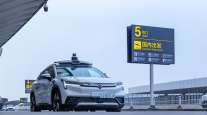China Is Said to Move Toward Lower Tariffs on U.S.-Made Cars

China is moving toward cutting its trade-war tariffs on imported U.S.-made cars, a step already claimed by President Donald Trump as a concession won during trade talks in Argentina.
A proposal to reduce tariffs on cars made in the United States to 15% from the current 40% has been submitted to China’s Cabinet to be reviewed in the coming days, according to people familiar with the matter. Shares of carmakers including Daimler AG, Ford Motor Co. and Tesla Inc. rose on the news.
The step hasn’t been finalized and could change. While reversing the retaliatory duty is a major climb-down by Beijing, it could refocus the two sides toward implementing the trade-war truce agreed earlier this month. Relations have since been shaken by the arrest of Huawei Technologies Co. Chief Financial Officer Meng Wanzhou in connection with sanctions violations.
“Last week, events seemed to conspire to throw the truce into disarray, but the underlying incentives of both sides at the moment are to try to maintain that truce,” Freya Beamish, chief Asia economist at Pantheon Macroeconomics Ltd. “Now we are seeing the possibility that China will come through with reductions of tariffs on U.S. autos and that’s another good, concrete step.”
Top Chinese and American trade officials spoke by phone the morning of Dec. 11 Beijing time, signaling that dialog between the nations on trade issues is at least continuing despite the ongoing tension over Huawei.
China’s Finance Ministry didn’t immediately respond to faxed request for comment sent outside business hours.

BMW AG, which exports sport utility vehicles from the United States to China, rose as much as 3.3%to 72.40 euros Frankfurt. The German luxury carmaker previously said the tariffs would cost the company 300 million euros ($340 million) this year alone.
Daimler, which cited the tariffs as the key reason in a profit warning in June, gained as much as 3.7%. Volkswagen AG rallied 4.6%, while Ford advanced 2.7% in pre-market trading. General Motors Co. was up about 3%, and Tesla added 1.8%.
In July, China had boosted the tariff on American-made cars to 40% as part of retaliatory measures against the United States. After a summit on trade in Buenos Aires earlier this month, Trump jolted global auto stocks with a tweet that China agreed to “reduce and remove” tariffs on imported American-made cars, something China did not confirm at the time.
Trump’s tweet came shortly after he agreed with Xi to a truce in the trade war during a meeting at the Group of 20 summit in Argentina.
The trade war has taken a toll on car companies that manufacture in the United States, with the makers of Mercedes-Benz and its BMW both warning of lower profits this year as tariffs forced them to hike prices in China. Car sales in the world’s second-biggest economy declined for a sixth consecutive month in November, bringing the market closer to its first annual drop in at least two decades. That’s piled pressure on auto companies that have relied on the country for growth amid declining car sales in the United States.
The tariff reduction benefits Daimler and BMW more than U.S. automakers such as General Motors Co. or Ford Motor Co. That’s because the German luxury brands dominate the top 10 list of vehicle imports into China.
Longer-term, China has a lot to gain from free trade in autos as Chinese manufacturers such as Guangzhou Automobile Group Co. and Geely Automobile Holdings Ltd. look to move overseas. The United States currently charges a 27.5% tax on imported cars from China.
Of China’s $51 billion of vehicle imports in 2017, about $13.5 billion came from North America, including sales of models made there by non-U.S. manufacturers such as BMW. China imported 280,208 vehicles, or 10% of total imported cars, from the United States last year, according to China’s Passenger Car Association.
U.S. exports of cars and light trucks to China were worth $9.5 billion in 2017 and have dropped off significantly since China imposed its retaliatory tariffs over the summer that gave exporters in Europe and Japan a significant advantage.
For Tesla, a tariff cut will provide a boon until the company sets up local production. The Palo Alto, Calif.-based carmaker has been working with Shanghai’s government on establishing a factory to assemble cars in China.
Foreign carmakers long have pleaded for freer access to China’s auto market, while its own manufacturers are trying to expand abroad. In April, China announced a timetable to permit foreign automakers to own more than 50% of local carmaking ventures.




